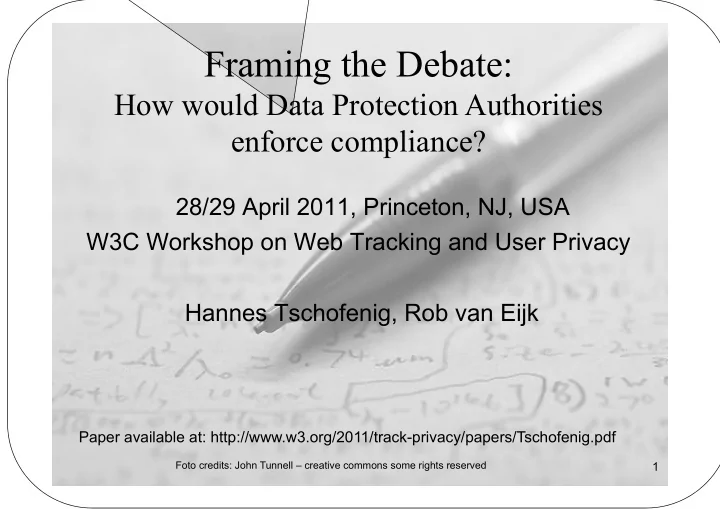

Framing the Debate: How would Data Protection Authorities enforce compliance? 28/29 April 2011, Princeton, NJ, USA W3C Workshop on Web Tracking and User Privacy Hannes Tschofenig, Rob van Eijk Paper available at: http://www.w3.org/2011/track-privacy/papers/Tschofenig.pdf Foto credits: John Tunnell – creative commons some rights reserved 1
Recent EU Developments • MEP Redding: if US companies are targeting EU citizens, EU data protection law applies 1 • MEP Kroes: not informing citizens upfront and not asking for consent is a line crossed 1 1 Retrieved from http://reporter.kro.nl/uitzendingenreporter/_2011/facebook-friends-for-life.aspx 2
Q&A: Which authority enforces? • The EC Privacy directive (95/46 EC) is implemented in national privacy laws. • EU directive 2009/136 EC covers cookies and data breach notifications. • In Europe Data Protection Authorities / Telecom authorities enforce these laws. 3
Q&A: Are mechanisms enforceable under current laws? Article 7 Member States shall provide that personal data may be processed only if: (a) the data subject has unambiguously given his consent; or (b) processing is necessary for the performance of a contract to which the data subject is party or in order to take steps at the request of the data subject prior to entering into a contract; or (c) processing is necessary for compliance with a legal obligation to which the controller is subject; or (d) processing is necessary in order to protect the vital interests of the data subject; or (e) processing is necessary for the performance of a task carried out in the public interest or in the exercise of official authority vested in the controller or in a third party to whom the data are disclosed; or (f) processing is necessary for the purposes of the legitimate interests pursued by the controller or by the third party or parties to whom the data are disclosed, except where such interests are overridden by the interests for fundamental rights and freedoms of the data subject which require protection under Article 1 (1). 4
Q&A: How can self- regulatory programs help? Is additional legislation needed? • Balance has to be maintained between • Legitimate business interest, and • fundamental rights and freedoms of the data subject • So far the self-regulatory efforts have not lived up to the expectations. • Therefore, explicit consent is becoming more important from a legislative point of view. 5
Our Perspective • DNT debate is not only about behavioral advertising; much broader in scope (includes re- identification and profiling) • Stakeholders have different scope (and also different terms). • Technology provides building blocks and opinions of data protection authorities provide building blocks for terminology. 6
Important References • DIRECTIVE 95/46/EC OF THE EUROPEAN PARLIAMENT AND OF THE COUNCIL of 24 October 1995 on the protection of individuals with regard to the processing of personal data and on the free movement of such data • ARTICLE 29 DATA PROTECTION WORKING PARTY, Opinion 1/2010 on the concepts of "controller" and "processor”, WP 169, Adopted on 16 February 2010 • A comprehensive approach on personal data protection in the European Union, COM(2010) 609 final • DIRECTIVE 2009/136/EC OF THE EUROPEAN PARLIAMENT AND OF THE COUNCIL of 25 November 2009amending Directive 2002/22/EC on universal service and users’ rights relating to electronic communications networks and services, Directive 2002/58/EC concerning the processing of personal data and the protection of privacy in the electronic communications sector and Regulation (EC) No 2006/2004 on cooperation between national authorities responsible for the enforcement of consumer protection laws • ARTICLE 29 DATA PROTECTION WORKING PARTY, Opinion 4/2010 on the European code of conduct of FEDMA for the use of personal data in direct marketing, WP 174, Adopted on 13 July 2010 • ARTICLE 29 DATA PROTECTION WORKING PARTY, Opinion 3/2010 on the principle of accountability, WP 173, Adopted on 13 July 2010. • ARTICLE 29 DATA PROTECTION WORKING PARTY, Opinion 8/2010 on applicable law, WP 179, Adopted on 16 December 2010 • ARTICLE 29 DATA PROTECTION WORKING PARTY, Opinion 2/2010 on online behavioural advertising, WP 171, Adopted on 22 June 2010. • ARTICLE 29 DATA PROTECTION WORKING PARTY, Opinion 4/2007 on the concept of personal data, WP 136, Adopted on 20th June 7
THANK YOU ! Hannes Tschofenig Hannes.Tschofenig@nsn.com Rob van Eijk R.J.van.Eijk@umail.leidenuniv.nl 8 Foto credits: Garr Reynolds – creative commons some rights reserved
Recommend
More recommend